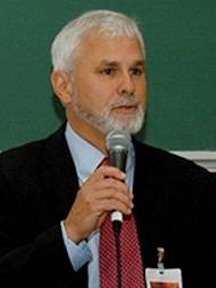By Jacob Sandstrom
Complex ethical issues require careful, reasoned solutions. George R. Lucas, Jr., a leading ethicist and scholar, has devoted his career to understanding one of life’s thorniest questions: the morality of war.
In 1971, Lucas graduated summa cum laude in physics from the College of William and Mary and was elected to Phi Beta Kappa. During his undergraduate years, Lucas conducted important research in intermediate energy particle physics, receiving awards and accolades for his achievements. Continuing his education at Northwestern University, Lucas began graduate work in physics but soon changed direction. In 1978, he received his Ph.D. in philosophy.
Among myriad professional accomplishments, Lucas is the Distinguished Chair in Ethics Emeritus at the United States Naval Academy, as well as Professor Emeritus of Ethics and Public Policy at the Naval Postgraduate School. In retirement, he recently served for a year as the Vice Admiral James B. Stockdale Chair of Ethics at the U.S. Naval War College, and currently is the Visiting Distinguished Inamori Scholar at the Inamori International Center for Ethics and Excellence. Lucas is President of the International Society for Military Ethics, while also serving as General Editor of the Collected Critical Edition of the Works of Alfred North Whitehead for Edinburgh University Press.
Reflecting on his ever-evolving, impressive career, Lucas noted the importance of maintaining a wide range of academic interests. “A solid grounding in the liberal arts and sciences is the best preparation for whatever life throws at you,” he remarked, recounting the many unexpected opportunities he has enjoyed. “I had no inkling while studying physics and mathematics that I would end up working closely in supposedly unrelated fields like history, philosophy, and public policy. But [William and Mary]’s strong requirements in all these other areas allowed me to make that transition.”
Studying during the Vietnam War, Lucas’ intellectual curiosity led him to specialize in military ethics. A prolific author, Lucas’ publications range from ethical analyses and war theory to humanitarian intervention, military anthropology, hybrid warfare, and exotic emerging technologies like robotics, human enhancement, and cyber conflict. His books and articles play a key role in ethical leadership courses across the country, while his lectures captivate audiences around the globe.
Most recently, Lucas authored Ethics and Cyber Warfare (Oxford University Press, 2016), the work that first predicted the rise of “state-sponsored hacktivism” as an alternative to effects-based cyber weapons. This has since emerged as the predominant form of cyber warfare employed by militaries and governments around the world. Establishing an ethical code for cyber war in all its surprising and unanticipated manifestations is a commendable endeavor, especially given the pervasive threats posed by these novel forms of conflict.
Lucas understands that engaging in these dialogues is critical for the future. “There is no more profound moral challenge than entrusting the use of deadly force to those charged with protecting a nation and its citizens from harm, let alone extending that protection to vulnerable and endangered persons elsewhere,” Lucas notes. “Wise and judicious use of such power requires citizens and governments to provide their soldiers, sailors, airmen and Marines with the most rigorous and demanding educational preparation,” both tactically and ethically. Echoing Plato, Lucas added that “preparing men and women to serve, protect, and lead the State” is the primary task of the liberal arts.
Making distinctions, thinking clearly, and engaging in analysis are essential to the betterment of humankind. “At the core of liberal education is more than a set of capacities and skills in specific academic subjects,” he states. “Those capacities collectively nurture the kind of informed, critical thought and prudent judgment essential to wise, just, and effective leadership and responsible citizenship.”
A staunch supporter of the liberal arts, Lucas has served in the past as a senior administrator in the National Endowment for the Humanities Research and Fellowships Divisions and strives to advance liberal education in his daily work. “Membership in the nation’s founding chapter of ΦBK has always ranked as the pinnacle of my own educational experience,” he said. “Ever since, the Society’s ongoing vigorous and visionary championing of liberal arts education for the nation and its students has served as a profound inspiration and encouragement to me in my own career.”
Jacob Sandstrom is a junior at Case Western Reserve University majoring in Political Science. Case Western Reserve University is home to the Alpha of Ohio Chapter of Phi Beta Kappa.




